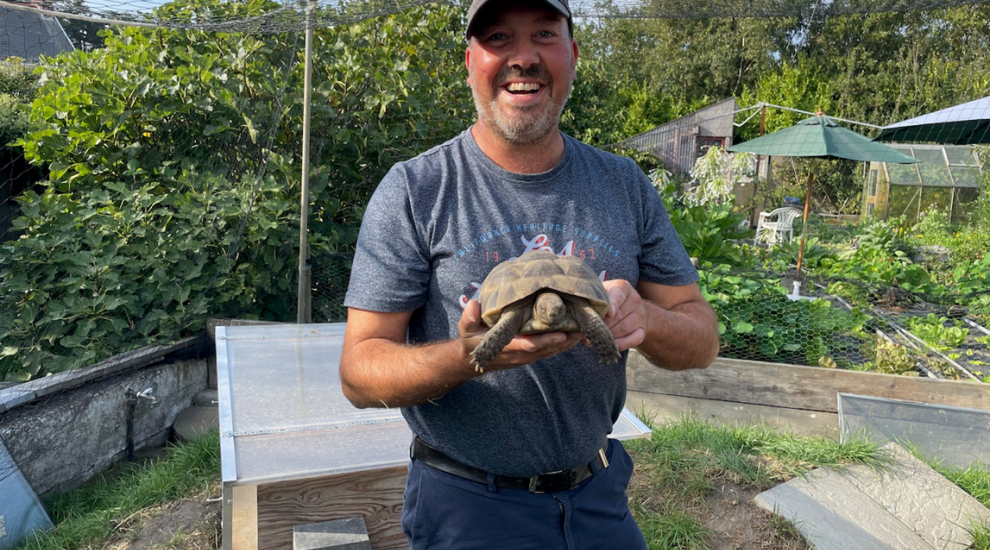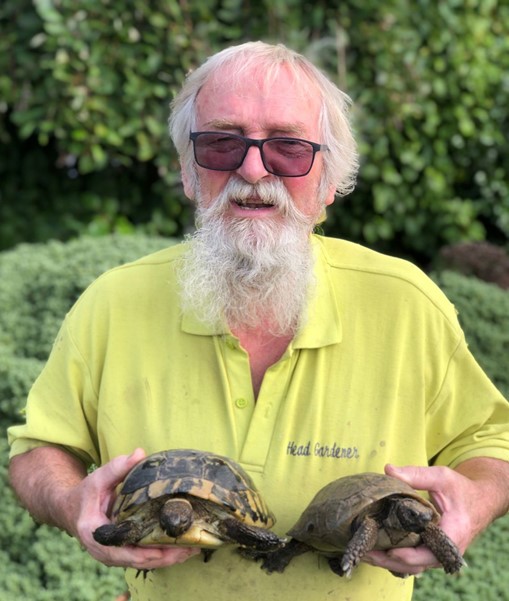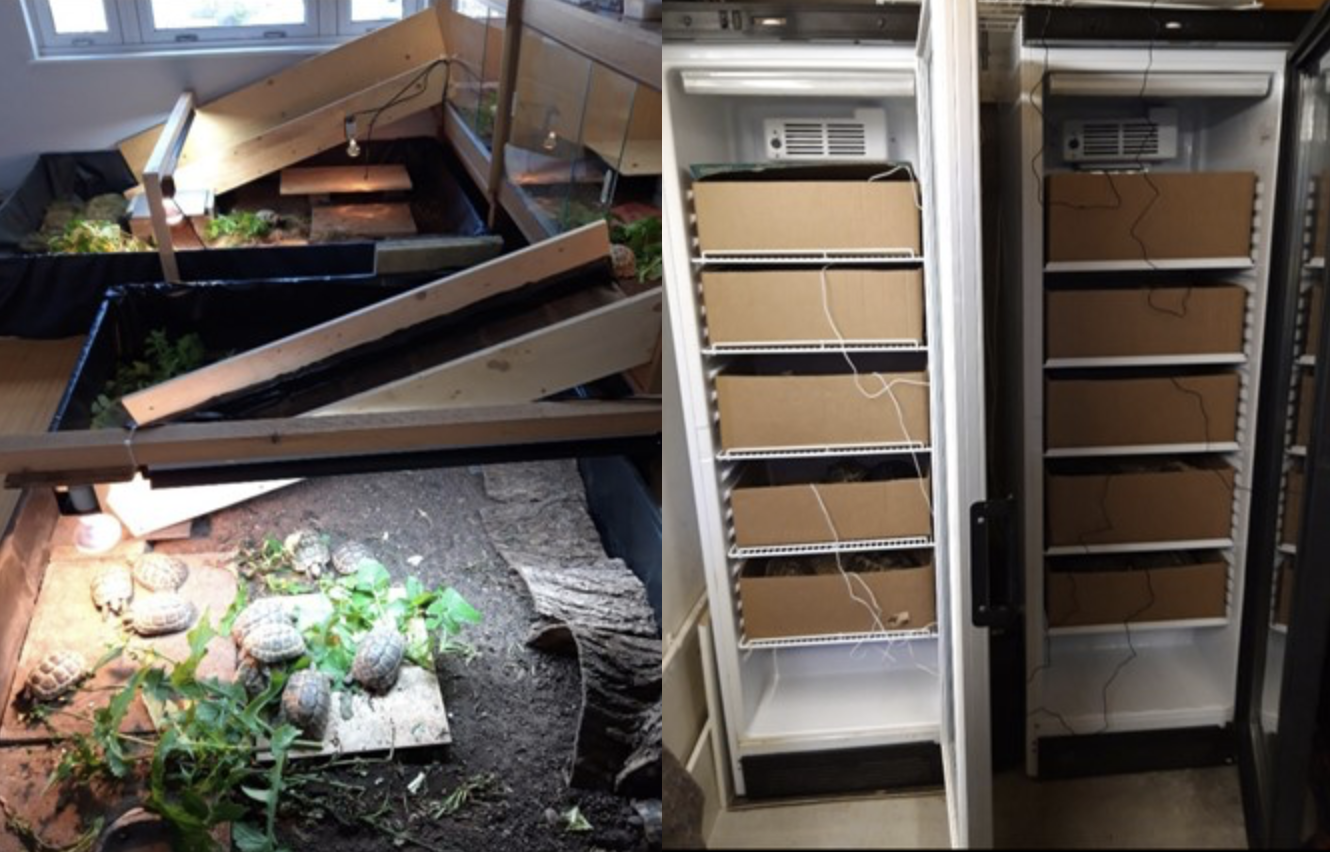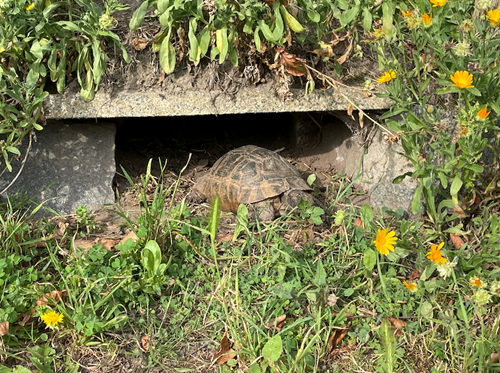


In the peace and quiet of the Vale in Guernsey lives a postman with his very own 'creep' of tortoises... 57 in total, with Timmy, Mummy, Alice, and Tinkerbell among them.
Having delivered mail to people in the parish for 25 years Lawson Pipet is considered one of the best known faces in the Vale, but his reptilian friends are now the ones attracting the attention.
Mr Pipet, helped by his dad, his partner and his stepson, looks after all of his tortoises himself, meaning he is responsible for their habitat, feed, breeding, and hibernating.
The latter task alone means he has four industrial-sized fridges in a shed, which he uses during the winter months.
The hobby was first sparked by his dad's own interest in the animals.
"It was many years ago when I was a teenager – that's where it kind of all kicked off. It all started from my parents when my dad had a couple of tortoises and it grew from there," he explained.
"We tried breeding them and it wasn't very successful, but our technology has improved over the 20 or 30 years' timeframe to now."
The improvements have been such that he now has 57 of them ranging in age from 18 months to well over 50.
Many of his tortoises have been adopted from other people who, for various reasons, are unable to look after them anymore. He said this happened a lot during and after covid, as people's lifestyles changed due to the pandemic.

Pictured: Lawson Pipet senior with two of his original tortoises - Timmy and Mummy.
With so many of the reptiles – collectively known as a 'creep' – living in his garden, Mr Pipet has launched the Guernsey Tortoise Keepers group, which has its own Facebook page, so he can share tips and techniques for tortoise handling and breeding with other owners.
"It's my hobby, and I love my hobby but I can't answer medical things because you need to speak to a vet," he said.
"I can tell you what I've done and what experience I've got, and it's all from my personal experience."
One thing Mr Pipet has learned from handling his own large creep is that not all tortoises will hibernate and some will hibernate earlier than what is considered normal.
"People are told that they can't hibernate until they're five years old, however I hibernate mine from the second winter. That's my experience," he said.
"I've lost two tortoises during hibernation but if you think of how many I've had, and at one point I was up to 81, then the odds of not surviving a hibernation is pretty slim."
With so many mouths to feed, Mr Pipet considers himself lucky to work for Guernsey Post, meaning he is always out and about meeting different people as he takes them their mail. He is normally delivering in the Vale so he can arrange to weed a parishioner's garden and take the vegetation home for his pets.

Pictured: Some of the specialist equipment Mr Pipet uses for his tortoises.
Keeping them all well fed is one thing, but he also needs to ensure they have enough room in their enclosures.
Some tortoises are more social than others, with some needing to be kept alone. Mr Pipet said he and his father spend some of the time when the tortoises are hibernating making sure the enclosures are ready for them when they wake up so they all have enough space to rest and to roam.
Some of Mr Pipet's oldest tortoises came from his dad originally so, although he can only estimate their age, he is confident that some are well over 50 years old. He suspects some might even be closer to 100.
He refers to his babies and toddlers knowing they have a lot of growing up to do before they are considered an adult at 20 years old, even though they can breed before that.
"It's like any animal, they need to breed and they'll breed at quite a young age or show signs of it by being aggressiveness or dominant. They're learning and they're picking up these things from around five years old.
"You can all of a sudden have a group of tortoises or even two tortoises and one will be more dominant over the other and that's why they say that they shouldn't really be housed together. They're solitary animals but I think that's dependent on breed and you know if they're fighting or if you're gonna always have one that's going to be more dominant and then you can change the whole dynamics of the group."
Generally speaking, some tortoises have more dominant personalities while others are more placid, explained Mr Pipet. He can also recognise his tortoises through their different sizes and markings.
Tinkerbell is his largest tortoise at more than 5kg, while he also has one called Dudley who is far smaller. Alice "looks really old", while there have been others called Mummy, Daddy, and Timmy. Some he has named himself, while any which have been given to him have kept their existing names.

Pictured: Mr Pipet's garden is designed to give his tortoises interesting places to live.
If anyone else is interested in tortoise-keeping as a hobby, Mr Pipet warns it is expensive, with the animals needing lots of looking after as well as their feed, enclosures and hibernation space being provided.
He said they can need UV lighting, heat, and a tortoise table – to name just a few elements of the specialist kit required.
"I think people get sucked into thinking that they're just going to put it out in the garden but when you do the research on the different breeds, what size tortoise are you thinking about? It you've only got a small garden, then really you only need a small breed but if you've got a larger garden maybe you could get away with a larger breed. Or if you decide to go for two tortoises you've always got to remember that you may need to separate them so you may need two set-ups.
"They're all the challenges, but it's forever changing and the same with hibernation. Years ago we used to put straw in a box and put them in a garage and hope they made it to next spring however I tend to use the fridge and I've been doing that for 15 years, and then the most important thing is to open the door for fresh air every day."
Mr Pipet, helped by his dad, his partner and his stepson, looks after all of his tortoises himself, meaning he is responsible for their habitat, feed, breeding, and hibernating.
The latter task alone means he has four industrial sized fridges in a shed which he uses during the winter months.
Mr Pipet wants to ensure everyone knows he isn't an expert in tortoise keeping, and that his interest is as a hobby which has grown since being sparked by his dad's own interest in the animals.
Comments
Comments on this story express the views of the commentator only, not Bailiwick Publishing. We are unable to guarantee the accuracy of any of those comments.